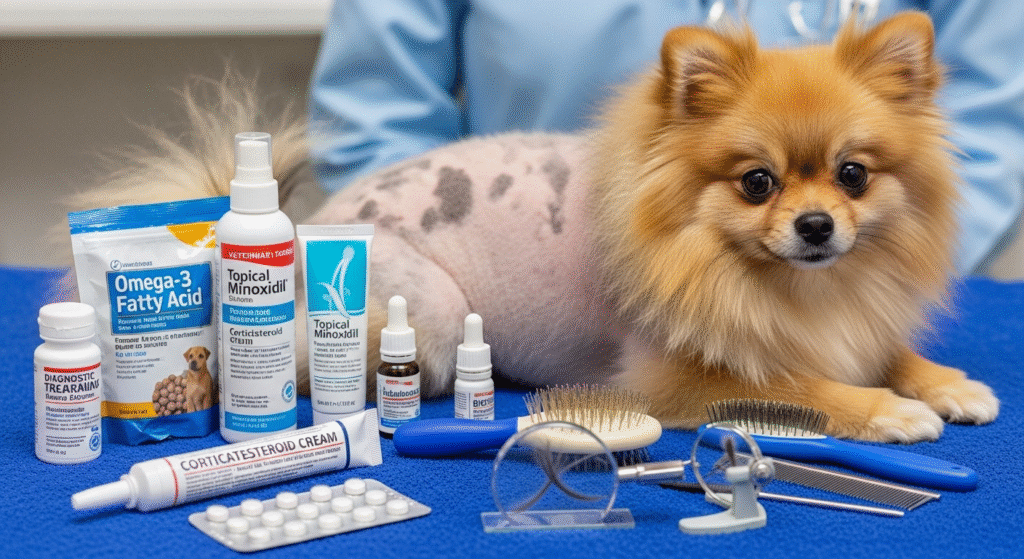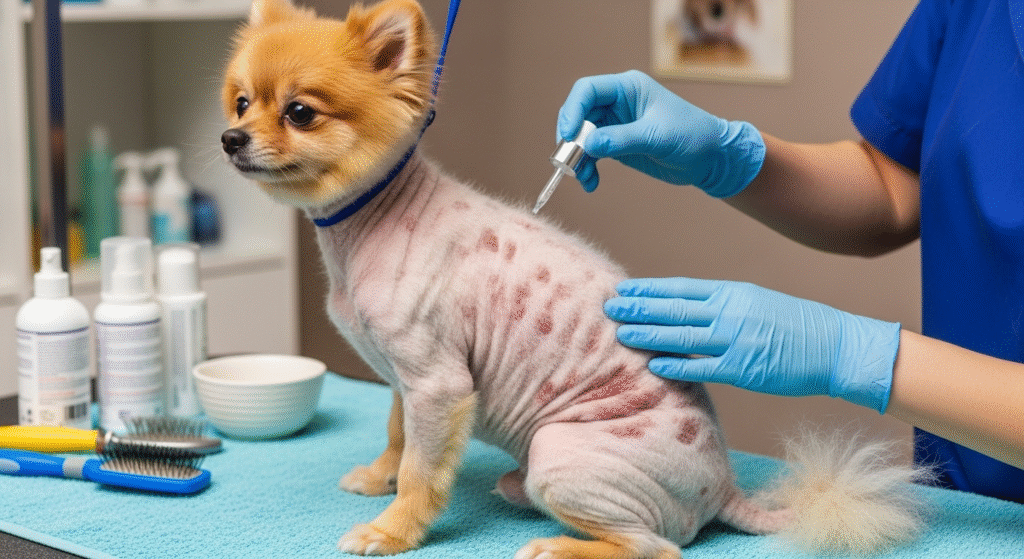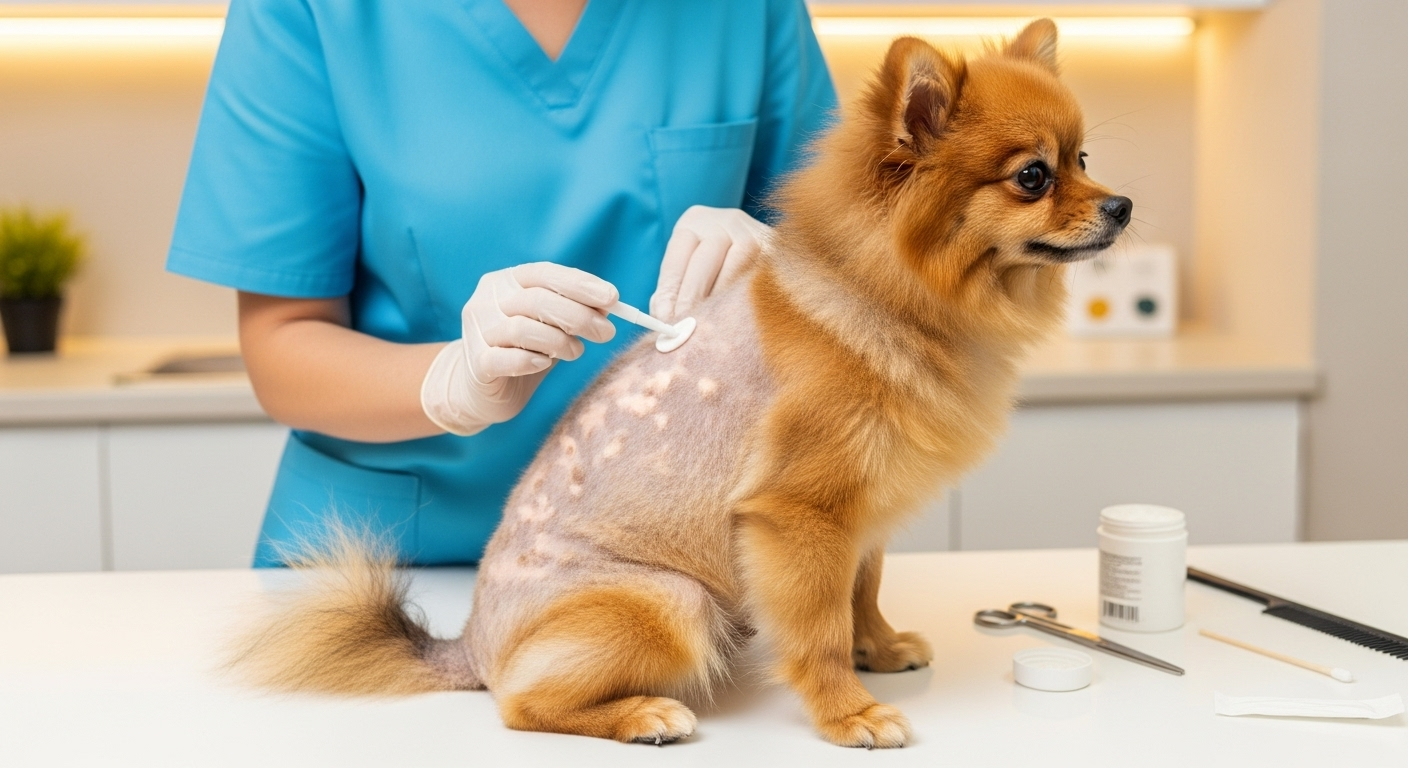Pomeranian Hair Loss Treatment? If your Pomeranian is experiencing hair loss,, particularly on the trunk and thighs, it may be suffering from a condition called Alopecia X, commonly known as Black Skin Disease. This condition leads to symmetrical hair loss and skin darkening, often affecting otherwise healthy dogs. In this guide, we’ll explore the causes …
Pomeranian Hair Loss Treatment? If your Pomeranian is experiencing hair loss,, particularly on the trunk and thighs, it may be suffering from a condition called Alopecia X, commonly known as Black Skin Disease.
This condition leads to symmetrical hair loss and skin darkening, often affecting otherwise healthy dogs. In this guide, we’ll explore the causes of Pomeranian hair loss and provide effective treatments to help restore your dog’s coat.

What Is Pomeranian Hair Loss?
Understanding Alopecia X in Pomeranians
Alopecia X is a non-inflammatory condition that primarily affects Pomeranians and other Nordic dog breeds. It’s characterized by symmetrical hair loss, particularly on the body, leaving the head and limbs mostly unaffected. This hair loss is often accompanied by darkened skin, giving it the name “Black Skin Disease.”
- Symptoms: Hair loss starts on the trunk and thighs, with the skin becoming darker and thicker over time.
- Diagnosis: Diagnosing Alopecia X involves ruling out other conditions such as fungal infections, parasites, and hormonal imbalances.
While Alopecia X is not life-threatening, it can be distressing for both dogs and their owners. Proper diagnosis and treatment are crucial for managing the condition.
Causes of Hair Loss in Pomeranians
Exploring the Potential Triggers
The exact cause of Alopecia X is not fully understood, but several factors may contribute to the condition:
- Genetics: Alopecia X has a genetic component and is commonly seen in Nordic breeds like Pomeranians, Samoyeds, and Chows.
- Hormonal Imbalances: Disruptions in growth hormone levels or adrenal sex hormones are suspected to play a role.
- Environmental Factors: Stress, trauma, and over-grooming may trigger or worsen the condition.
Understanding the underlying cause is essential for choosing the right treatment for your Pomeranian’s hair loss.
Conventional Treatments for Pomeranian Hair Loss

Veterinary-Recommended Options
While there is no cure for Alopecia X, several treatments can help manage symptoms and promote hair regrowth:
- Melatonin Therapy: Melatonin has been shown to be effective in stimulating hair regrowth in some cases. It’s often administered as an oral supplement.
- Hormonal Injections: Medroxyprogesterone acetate (MPA) injections have been used with some success in encouraging hair regrowth.
- Neutering: In some cases, spaying or neutering a Pomeranian can lead to hair regrowth, as it helps balance hormone levels.
These treatments are typically prescribed by a veterinarian and may take several months to show results. It’s important to monitor your dog’s progress and consult with your vet regularly.
Alternative and Complementary Treatments
Holistic Approaches to Support Hair Health
In addition to conventional treatments, there are several alternative and complementary therapies that can support your Pomeranian’s hair health:
- Microneedling: This technique involves using small needles to create micro-injuries in the skin, which can help stimulate hair follicles and promote hair regrowth.
- Platelet-Rich Plasma (PRP) Therapy: PRP injections use your dog’s own blood to stimulate healing and hair growth in affected areas.
- Topical Treatments: Certain shampoos and topical treatments, such as Recovery Mask, can help hydrate and nourish hair follicles.
Before pursuing any alternative therapies, always consult with your veterinarian to ensure they are safe and appropriate for your dog.
At-Home Care and Maintenance
Supporting Your Pomeranian’s Coat Health
Alongside professional treatments, at-home care is essential for promoting healthy hair growth:
- Regular Grooming: Brush your Pomeranian’s coat regularly to remove tangles and mats, which can hinder hair growth.
- Moisturizing Shampoos: Use gentle, hydrating shampoos to maintain healthy skin and promote follicle strength.
- Balanced Diet: Ensure your dog’s diet includes essential fatty acids, vitamins, and minerals, which support overall coat health.
A well-balanced diet and regular grooming can go a long way in supporting your Pomeranian’s recovery from hair loss.
When to Consult a Veterinarian
Seeking Professional Guidance
If your Pomeranian’s hair loss persists despite at-home care, it’s essential to consult with a veterinarian. Your vet can assess the condition and recommend the best course of treatment.
- Persistent Hair Loss: If the hair loss continues or worsens, seek professional help to rule out other causes.
- Skin Infections: If your dog’s skin shows signs of infection, such as redness or discharge, it’s important to get medical attention.
- Behavioral Changes: If your dog exhibits changes in behavior or appetite, these may indicate underlying health issues.
Regular veterinary checkups are crucial for managing your Pomeranian’s health and ensuring the best possible outcome for their treatment.
FAQs
Can Alopecia X be cured?
Currently, there is no cure for Alopecia X, but various treatments, including melatonin therapy and hormonal injections, can help manage the condition and promote hair regrowth.
Is Alopecia X painful for my dog?
No, Alopecia X is a non-inflammatory condition that typically does not cause pain. However, the condition may lead to skin changes, which can sometimes cause discomfort.
Can diet affect hair loss?
Yes, a poor diet can contribute to hair loss. Ensuring your Pomeranian has a balanced diet rich in fatty acids and essential nutrients can support overall coat health.
Conclusion
Pomeranian hair loss, particularly due to Alopecia X, can be concerning for pet owners. While there is no definitive cure, various treatments, both conventional and alternative, can help manage the condition and promote hair regrowth. With proper care, treatment, and professional guidance, you can support your Pomeranian’s health and restore their coat to its former glory.
Consult with a Specialist
If your Pomeranian is experiencing hair loss, it’s essential to consult with a veterinary dermatologist. They can offer a comprehensive diagnosis and treatment plan to help restore your dog’s coat. Early intervention can make a significant difference in managing Alopecia X effectively.






